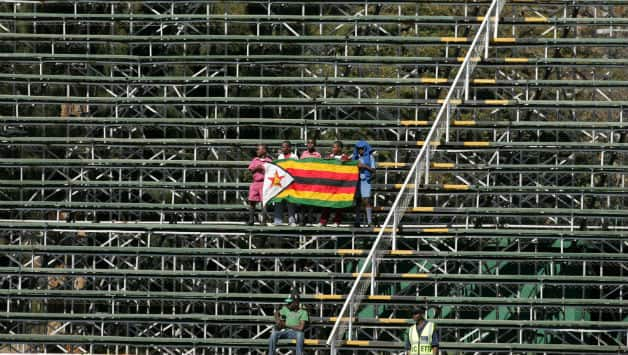
Cricket Country Staff
Editorial team of CricketCountry.
Written by Cricket Country Staff
Published: Aug 02, 2013, 12:34 PM (IST)
Edited: Aug 02, 2013, 12:34 PM (IST)


Zimbabwean cricket is close to bankruptcy and is unable to pay players on time © AFP
Bulawayo: Aug 2, 2013
Zimbabwean cricket is at crossroads. There is an increasing sense of disinterest in the country for the game. The players do not get paid and the disparity between their Indian counterparts is massive.
Just a few days back, the Indian team celebrated victory in the third One-Day International (ODI) of the five-match series in Harare by heading to their team hotel.
They are the visitors. The hosts, though, were in no mood for celebration and stayed put at the Harare Sports Club. They did not have a team hotel to go to and they had their dinner in a buffet at the same venue, as reported by The Indian Express.
Some players also had to arrange for a car pool and some for a public transport system to reach Bulawayo for the last two ODI matches. The team has checked in at Holiday Inn, but have to travel thrice a day to the stadium to have their meals.
This only highlights the fact that Zimbabwean cricket is close to bankruptcy as they are unable to pay their players for breakfast, lunch and dinner at team hotels nor arrange for a proper transport during an important home series.
Former batsman, Grant Flower, said that it was no secret that Zimbabwean cricket was at this kind of disarray and that there did not seem to be any light at the end of the tunnel.
“We are struggling. I’m not sure when we will come out of it. I don’t know the exact answers but Zimbabwe Cricket is under heavy debt. If this continues, our cricket might soon lose its identity,” said Flower, who is also the team’s batting coach.
The matches also have been one-sided, which enlightens the skill quotient in both the young camps. Zimbabwe are currently 4-0 down in the series. There is also a vast gulf in both the incentives received by both set of players. One is headed by the world’s richest cricketing board and the other is barely able to provide for its own cricketers.
India’s series captain Virat Kohli’s Grade A central contract earns him close to $186,000 a year. On the other side Zimbabwe captain Brendan Taylor gets about $6,000 a year. That is only $1,000 more than the other members of the Indian team for playing in an ODI. The Indian cricketers also earn a daily amount of $80, apart from their match fee.
There is no allowance or match fees for Taylor and his teammates. Taylor stands in a small company of Zimbabwe cricketers to get a four-figure pay check. Almost all the others have signed a winter contract of $500.
But it does not end there as the payments are usually never on time. “There is no money coming in. Cricket Zimbabwe owes me $1,500. It’s a big risk being a cricketer in this country,” a member of the current squad said on anonymity.
A few years back, it was such differences that brought about the constant threats of player boycotts and a huge exodus of talented cricketers. Due to these reasons, some have even left cricket as a career choice.
“Zimbabwe needs more international cricket,” said Flower in an almost desperate sounding plea.
This website uses cookies so that we can provide you with the best user experience possible. Cookie information is stored in your browser and performs functions such as recognising you when you return to our website and helping our team to understand which sections of the website you find most interesting and useful.
Strictly Necessary Cookie should be enabled at all times so that we can save your preferences for cookie settings.
If you disable this cookie, we will not be able to save your preferences. This means that every time you visit this website you will need to enable or disable cookies again.
